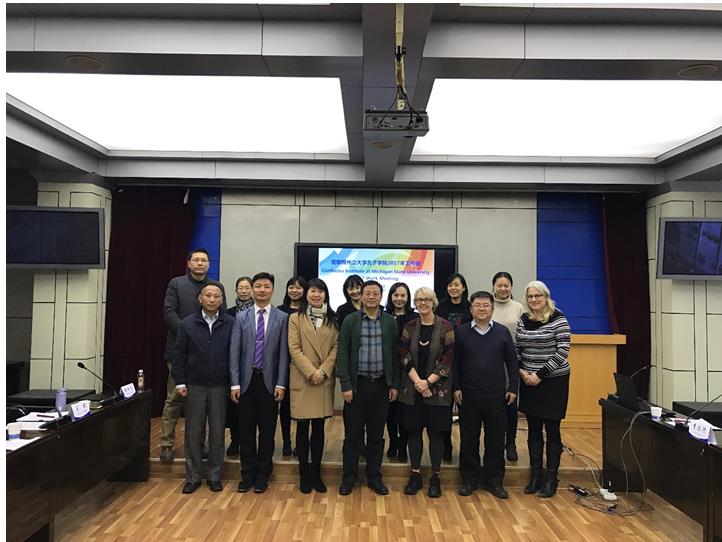 On 13th December 2017, a work meeting of the Confucius Institute at Michigan State University (MSU), the first of its kind after the renewal of a new ten-year cooperation agreement between the Open University of China(OUC) and MSU in February 2017, was held in Xi'an, Shaanxi province.
On 13th December 2017, a work meeting of the Confucius Institute at Michigan State University (MSU), the first of its kind after the renewal of a new ten-year cooperation agreement between the Open University of China(OUC) and MSU in February 2017, was held in Xi'an, Shaanxi province.

The meeting summarised the work that had taken place in both China and the USA and the development of the cooperation in 2017, including in-depth discussions about the current problems faced by the Confucius Institute and the future of the cooperation.
OUC deputy party secretary Yang Xiaotang; executive director of the Confucius Institute at MSU, Dr. Lynn Paine; associate directors Dr. Nancy Romig and Dr. Li Jiahang; deputy executive director of the OUC Chinese Language Centre Yang Yongbo; deputy director Wang Shuo; and other related personnel attended the meeting.
Yang Xiaotang affirmed the achievements made by the OUC Confucius Institute over the 11 years since it was founded in 2006. In particular, he pointed to the years 2007 to 2009, when it was named an Advanced Confucius Institute and expanded the scale of the Confucius Institute by means of independent research and development of Chinese learning resources and the addition of many different Chinese courses. At the same time, he pointed out that the operation of the Confucius Institute requires closer cooperation between the two sides and that the space for future development and innovation is extensive. He stressed that, at the present stage, both sides should apply for support and assistance from their responsible universities and that the OUC will increase investment and support for the Confucius Institute and its Research and Development Centre in China in terms of both financing and resources. He hopes that both sides will fully leverage the advantages of distance education technology, boost interaction and communication between the two universities, continue to broaden their thinking, seek a customised development pathway, and become an example for other Confucius Institutes.
Yang Yongbo and Li Jiahang reported on the work of the Confucius Institute in 2017 on behalf of the Chinese and American sides, respectively. In 2017, the Confucius Institute of MSU continued to carry forward its traditional advantages. The number of students registered for online Chinese language teaching exceeded 4,000. Thirty-three teachers graduated with teaching qualification certificates in Chinese language teaching. In addition to regular cultural activities in the community, it also invited the education office of the Chinese consulate in Chicago to attend a forum and deliver a speech. For the Chinese office, work accelerated in two areas. On one hand, it provided course and software support for the Confucius Institute, accelerated the construction of degree education for Teaching Chinese to Speakers of Other Languages (TCSOL), and optimised and upgraded the MyEChinese platform. On the other hand, it supported the daily work of the Confucius Institute, including the training of Chinese language teachers, selecting and sending two teachers to teach in the USA, receiving nine overseas scholarship students, organising nearly 400 students for two HSK Chinese proficiency tests, preparing for the council conference, renewing a ten year cooperation agreement with the Confucius Institute, and carrying out online cultural activities and course construction together with the Confucius Institute in the USA.
Yang Yongbo, on behalf of the Chinese Learning Resources Development Centre of the Confucius Institute at MSU in China, described the work to come in the future, proposing that the two sides should strengthen communication and exchanges, not only in terms of student summer camps but also for projects such as short-term adult education technology, education management training, the training of Chinese language teachers, classroom observations, and trial lectures.
Lynn Paine discussed the projects proposed above and the specific problems she predicts may occur in the implementation with the Chinese side. She expressed her wish to actively promote cooperation and exchanges in such projects. In addition, she said that the trip to Xi'an had deepened their understanding of the OUC’s strengths in terms of educational operation. They now understand that the OUC’s organisational characteristics conform to the future development momentum of the Confucius Institute and that the advantages of the OUC’s country-wide organisational system and the academic advantage of MSU in the fields of educational technology and teacher training should be fully leveraged. She advocated the active expansion of cooperation with the OUC, in order to enhance the influence of Confucius Institute at MSU.
Yang Xiaotang stressed that the Confucius Institute must enhance its influence at MSU and at the OUC. In addition to promoting communication and exchange by organising visits from both sides, the Chinese side should also continue the study of the Blackboard website. The two sides should work together to improve the MyEChinese platform, carry out closer cooperation, leverage the advantages of both side, and contribute to the international development of the OUC.

By Zhang Xiangwen, OUC